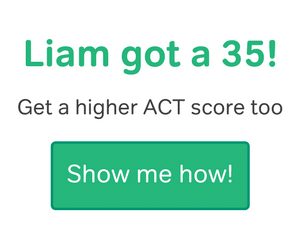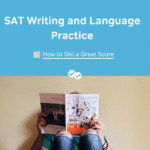
The ACT Writing test, or essay section, tests your ability to read different perspectives on a topic and present your own opinion in writing. It’s the optional last section of the exam, meaning that you don’t have to take it if you don’t want to–although there are many colleges and universities that require or recommend it for admissions. Here’s what you need to know about ACT Writing in a nutshell!
What is the ACT Writing section?
Here are the need-to-know facts about the ACT Writing section:
- It’s a 40-minute test to complete with pencil and paper
- You’ll get one essay prompt about a debatable topic and three different perspectives on it
- You have to:
- evaluate the three different perspectives
- present your own perspective (which may agree in part or in full with any of the provided viewpoints)
- explain the relationship between your viewpoint and the provided ones.
Do I have to take ACT Writing?
Nope! It’s not a required part of the exam. You can think of it as an add-on that, yes, also costs a little bit more. But whether the test requires the essay and whether colleges do are two separate issues. While you can submit the ACT without writing to many colleges and universities, others (including most super-competitive colleges) will ask you for it. Because the list of which colleges require ACT writing is constantly changing, it’s best to check with the individual schools you’re thinking of applying to before you register.
With that said, some students do take the exam before they know where they’ll be applying to college. So in this case, is it better to do the ACT test with or without writing? If you’re really uncertain, take it with writing. This will ensure that you don’t have to go back to the test center because you’ve decided to apply to a college that does require it in a few months! Yes, it requires some extra prep–but it’s worth it to keep your options open.
How does ACT Writing scoring work?
If you’ve been prepping for the ACT overall, you’re probably very (overly?) familiar with the 1-36 scoring scale by now. But this isn’t how the ACT essay is scored! Because it’s not a multiple-choice section, the essay has its own unique scoring. Take a look!
How ACT Writing Is Scored
The writing portion of the ACT is scored by two graders, each of whom will assign you a writing score of 1 to 6 on four different writing “domains.” These domains include:
- Ideas and Analysis: does your thesis statement and writing examine the implications of the issue with clarity and nuance?
- Development and Support: do you use well-developed and specific examples to support your thesis?
- Organization: does your essay have a strong structure and a logical flow?
- Language Use and Conventions: do you use correct grammar, word usage, mechanics, punctuation, and sentence structures?
Your total points added up between these two graders are converted from these domain scores to a scaled score of 2 to 12, which is the final score you will see on your score report.
Getting Your ACT Writing Scores
So you’ve done it! You sat down, you wrote your essay…now what? When will ACT Writing scores be available? Well, you’ll get your multiple-choice scores in around two weeks, and you’ll get your ACT Writing scores (and full score report) about two weeks after that. So anticipate waiting around a month to get the total view of how you did on the ACT essay.
Can ACT Writing hurt your score?
No! Not, that is, if you’re talking about the composite ACT score on the 1-36 scale. This is an average of your 1-36 scores in each of the four multiple-choice sections (Reading, Math, English, and Science). It doesn’t take your essay score into account. In other words–does the ACT writing score affect composite scores? It doesn’t.
With that said, the essay score will affect your ELA subscore on the exam. (You can see what this looks like on a score report here.) But colleges and universities are far more interested in your sectional and composite scores.
What essay score is good?
Generally, an 8+ is an excellent ACT Writing score, but it depends on where you’re applying. Ivy-League-bound students should aim for 9 or above!
Can ACT Writing be superscored?
Nope! The ACT superscore is a way of combining your highest multiple-choice scores from different sections and different test dates to give you the highest possible combination. But it only affects your composite score. Because the essay isn’t part of your composite score, it’s not part of the superscore, either.
What happens if I mess up on the writing section?
If you’re wondering if you can cancel the section after they’ve taken it, unfortunately, the answer is no. Once you’ve written the essay, your score will appear on your score report. But if you change your mind about taking the writing section of the ACT, you can cancel it before you get into the testing room.
If you feel that you didn’t do your best, or you get a lower score than you’d like, can you retake ACT Writing? Definitely! But for the moment, ACT sectional retesting is on hold—and it may or may not include the ACT writing test being taken separately. To retake ACT Writing, in other words, you’ll need to retake the entire exam…for now.
How to Improve Your Writing Score
So how do you boost your ACT essay score? Take a look at these tips!
✅ Practice planning and writing essays on practice ACT essay prompts. Although writing full essays (preferably as part of ACT practice tests) is the best practice, ten-minute outlining sessions in which you plan out your essay (like you will do on the test) can go a long way in helping you learn how to quickly generate and organize your ideas.
✅ If grammar is not your strong suit, check out our post on ACT grammar rules. Not only will this help you improve your grammar for the ACT essay, but it also will help you with the ACT English section!
✅ Share your writing with the strong writers you know and get feedback from them. Have them score your practice essays using the ACT rubric.
✅ Review the sample essays on actstudent.org so that you can get a sense of what kinds of essays get which scores. This can be incredibly helpful!
✅ Learn about current events and form your own opinions on them. Engage in lively debates with your friends and family so that you can practice supporting your opinions and anticipating opposing arguments!
Want even more? Read Your Magical Guide to Scoring a Perfect 12 on the ACT Essay, which will guide you through all the basics (if you’re a beginner) and how to improve your score (if you’ve already taken the test). There, you will find lots more writing tips and strategies that will help you show the ACT Writing test who’s boss. Happy Studying!






Leave a Reply